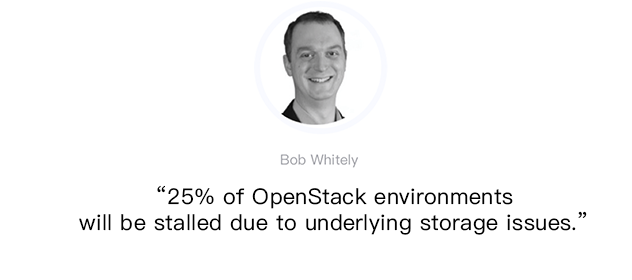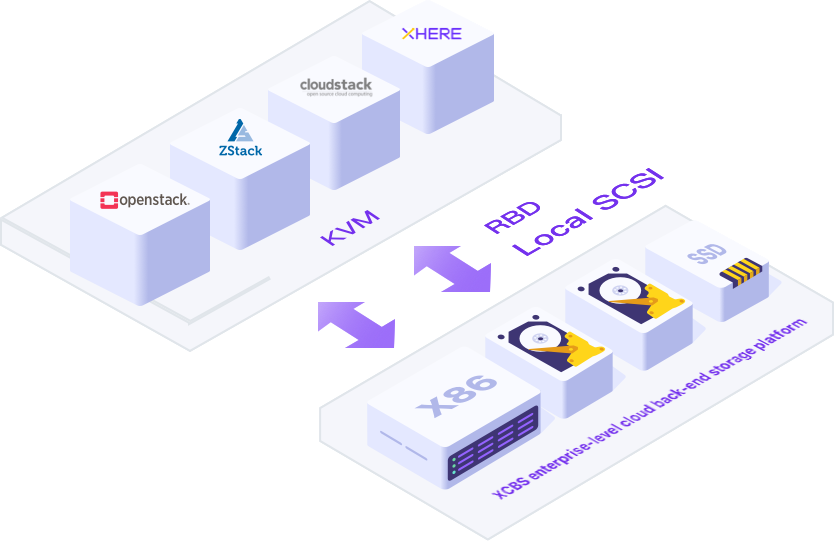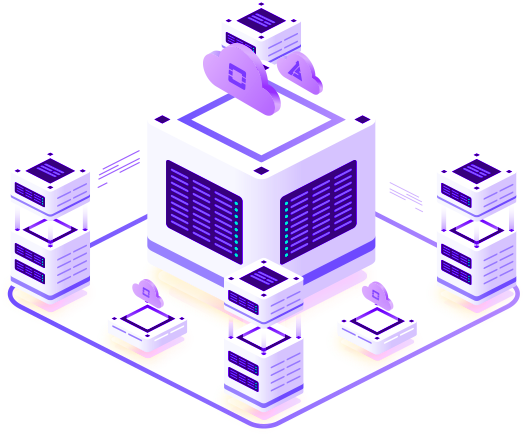User Needs
Back-end cloud storage problems based on open source virtualization
Open Source and Interoperability
The cloud platform based on open source virtualization technology has attracted the attention of the market since its birth. Communities such as OpenStack have built a good ecosystem for open-standard IaaS (Infrastructure as a Service). In order to seek the agility of the project, the aggregation of technical strength and the long-term self-controllability of the product, the manufacturer chooses OpenStack, CloudStack, ZStack and other open source cloud frameworks as the main architecture of the large-scale IaaS "cloud operating system" to build an enterprise private cloud. or application industry cloud platform.
Fully Distributed Architecture
In KVM-based cloud scenarios, most users will choose native Ceph, GlusterFS, BeeGFS, etc. as the underlying storage components to realize virtual machine block image management, image warehouse, and data backup. The mainstream open source distributed storage platform is widely used by large-scale Internet and high-performance computing operators. The deep participation of many leading manufacturers of hardware and operating system platforms ensures the advancement of open source component technology and high-quality interoperability among manufacturers.
Productization and SLA
However, open source distributed storage systems such as native Ceph also have several problems, which limit its wide use in enterprises:

Product Value
An enterprise-level distributed storage product
XCBS (XSKY Cloud Block Storage) storage is an enterprise-level distributed storage product developed by XSKY, which has been deeply optimized for the open source cloud environment. Compared with the upstream software of the community version, the XCBS distributed storage system has been deeply optimized in terms of stability, performance, reliability, and ease of use, realizing visualization and automatic operation and maintenance, and providing a reliable storage infrastructure for large-scale cloud environments support.

Product Advantages
Seamless alternative to open source solutions
Cloud-native, seamlessly connected to open source solutions
- The interface is 100% compatible with open source software
- Lightweight computing client, independent deployment and upgrade of cloud platform and storage, supports volume statistics and monitoring, and is easy to operate and maintain
- Rich RESTful API interface, multiple platform docking
- Manage the volume data of open source platforms such as Ceph through the RBD interface, and seamlessly migrate
Agile delivery, simplified operation and maintenance
- One-click installation and deployment, rapid expansion and upgrade
- Visual interface operation and maintenance operation
- End-to-end full indicator monitoring of log/alarm function
- Supports online migration of OpenStack cross-cluster virtual machines and storage. Supports self-service inspection tools, intelligently analyzes cluster health status, and identifies potential hidden dangers in the system in advance
- Support custom automatic rebalancing during idle time, automatically rebalance OSDs that are unbalanced due to expansion and shrinkage, and reduce the impact of OSD imbalances
Optimize system performance and maximize hardware potential
- Network/hard disk processing efficiency and IO path depth optimization SSD smart cache, data layered write, improve performance
- The patented LibRBD aggregation agent improves the performance of a single client by 20% and reduces the CPU utilization of each node by 40%
- Innovative IO aggregation, which aggregates random small block IO into sequential large block IO, providing stable IO performance under high pressure and high concurrency
Enterprise-level storage function, data disaster recovery protection
- Support IO level data verification to prevent silent disk errors
- Volume online expansion and contraction, volume automatic thin provisioning, QoS real-time change, adapt to complex scenarios of customer storage management
- ROW lossless instant snapshots, extended clusters to achieve high data reliability and availability
- Hard disk and network sub-health processing, automatic identification of bad disks, slow disks and network faults, and automatic isolation
Open Ecosystem
A variety of native protocols connect to the cloud platform to provide persistent block storage services
























